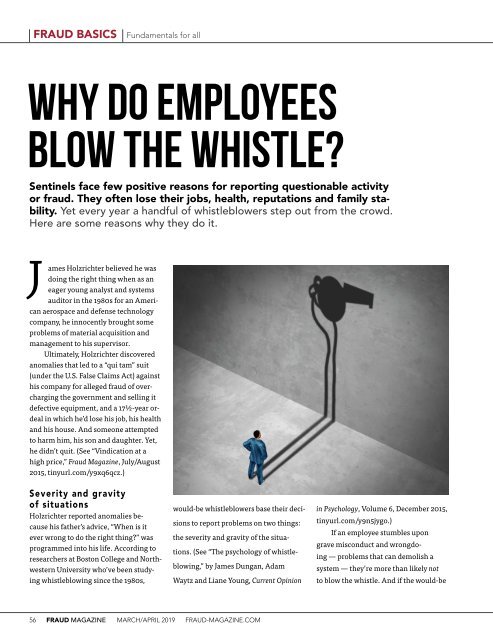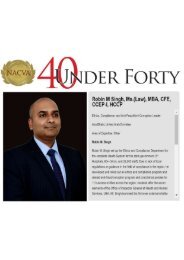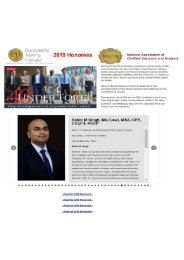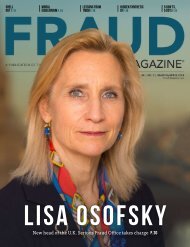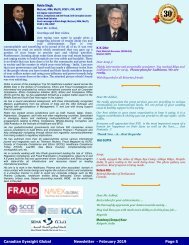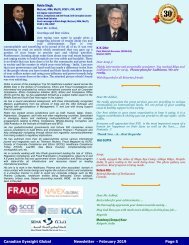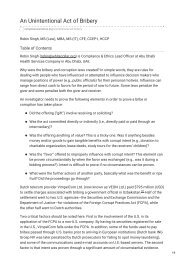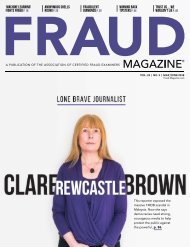Why do employees blow the #whistle? by #Robin #Singh (Published by #ACFE)
Read about what goes through the mind of a #whistleblower by Robin Singh. What are their thought process, sufferings, and internal dilemmas when they blow the whistle. According to the author, it is a true fight for #integrity and #ethics and intolerance towards #fraud, #misconduct, #non-compliance. Furthermore, most of the #whistleblowers are not a #compliance #Officer or a #fraud #Investigator or a #regulator, rather a common person on the ground who ensure the ecological balance between existence of a company versus practices adopted to reach a higher share price.
Read about what goes through the mind of a #whistleblower by Robin Singh. What are their thought process, sufferings, and internal dilemmas when they blow the whistle.
According to the author, it is a true fight for #integrity and #ethics and intolerance towards #fraud, #misconduct, #non-compliance. Furthermore, most of the #whistleblowers are not a #compliance #Officer or a #fraud #Investigator or a #regulator, rather a common person on the ground who ensure the ecological balance between existence of a company versus practices adopted to reach a higher share price.
You also want an ePaper? Increase the reach of your titles
YUMPU automatically turns print PDFs into web optimized ePapers that Google loves.
FRAUD BASICS<br />
Fundamentals for all<br />
<strong>Why</strong> <strong>do</strong> <strong>employees</strong><br />
<strong>blow</strong> <strong>the</strong> whistle?<br />
Sentinels face few positive reasons for reporting questionable activity<br />
or fraud. They often lose <strong>the</strong>ir jobs, health, reputations and family stability.<br />
Yet every year a handful of whistle<strong>blow</strong>ers step out from <strong>the</strong> crowd.<br />
Here are some reasons why <strong>the</strong>y <strong>do</strong> it.<br />
J<br />
ames Holzrichter believed he was<br />
<strong>do</strong>ing <strong>the</strong> right thing when as an<br />
eager young analyst and systems<br />
auditor in <strong>the</strong> 1980s for an American<br />
aerospace and defense technology<br />
company, he innocently brought some<br />
problems of material acquisition and<br />
management to his supervisor.<br />
Ultimately, Holzrichter discovered<br />
anomalies that led to a “qui tam” suit<br />
(under <strong>the</strong> U.S. False Claims Act) against<br />
his company for alleged fraud of overcharging<br />
<strong>the</strong> government and selling it<br />
defective equipment, and a 17½-year ordeal<br />
in which he’d lose his job, his health<br />
and his house. And someone attempted<br />
to harm him, his son and daughter. Yet,<br />
he didn’t quit. (See “Vindication at a<br />
high price,” Fraud Magazine, July/August<br />
2015, tinyurl.com/y9xq6qcz.)<br />
Severity and gravity<br />
of situations<br />
Holzrichter reported anomalies because<br />
his fa<strong>the</strong>r’s advice, “When is it<br />
ever wrong to <strong>do</strong> <strong>the</strong> right thing?” was<br />
programmed into his life. According to<br />
researchers at Boston College and Northwestern<br />
University who’ve been studying<br />
whistle<strong>blow</strong>ing since <strong>the</strong> 1980s,<br />
would-be whistle<strong>blow</strong>ers base <strong>the</strong>ir decisions<br />
to report problems on two things:<br />
<strong>the</strong> severity and gravity of <strong>the</strong> situations.<br />
(See “The psychology of whistle<strong>blow</strong>ing,”<br />
<strong>by</strong> James Dungan, Adam<br />
Waytz and Liane Young, Current Opinion<br />
in Psychology, Volume 6, December 2015,<br />
tinyurl.com/y9n5jygo.)<br />
If an employee stumbles upon<br />
grave misconduct and wrong<strong>do</strong>ing<br />
— problems that can demolish a<br />
system — <strong>the</strong>y’re more than likely not<br />
to <strong>blow</strong> <strong>the</strong> whistle. And if <strong>the</strong> would-be<br />
56 FRAUD MAGAZINE MARCH/APRIL 2019 FRAUD-MAGAZINE.COM
whistle<strong>blow</strong>er isn’t sure about <strong>the</strong> validity<br />
of what <strong>the</strong>y’ve uncovered, <strong>the</strong>y’re<br />
unlikely to tell authorities because <strong>the</strong>ir<br />
career could be destroyed if <strong>the</strong>y’re<br />
proven wrong. Whistle<strong>blow</strong>ers might<br />
spend years investigating a case before<br />
<strong>the</strong>y report it.<br />
A whistle<strong>blow</strong>er never wants to<br />
be wrong or proven wrong. That’s why<br />
even though 45 percent of workers<br />
might notice wrong<strong>do</strong>ing, only 65 percent<br />
of <strong>the</strong>m are likely to report what<br />
<strong>the</strong>y saw, according to a 2011 National<br />
Business Ethics Survey, “Retaliation:<br />
When Whistle<strong>blow</strong>ers Become Victims,”<br />
tinyurl.com/yd2wt44d. They’ll<br />
likely brush it off as anomalies or<br />
chalk it up to human error. According<br />
to <strong>the</strong> Ethics & Compliance Initiative,<br />
nearly none receive widespread media<br />
coverage. (See “Retaliation against<br />
Whistle-Blowers: No Good Deed Goes<br />
Unpunished,” <strong>by</strong> Michael McMillan,<br />
CFA, Enterprising Investor, Oct. 24,<br />
2012, tinyurl.com/y8b2fa5e.)<br />
A whistle<strong>blow</strong>er is counted as one<br />
only if <strong>the</strong>y’re employed <strong>by</strong> <strong>the</strong> organization<br />
that <strong>the</strong>y’re reporting on and can<br />
suffer <strong>the</strong> consequences of <strong>the</strong>ir actions<br />
from that organization. An outsider,<br />
independent person or committee that<br />
uncovers wrong<strong>do</strong>ing often isn’t considered<br />
a whistle<strong>blow</strong>er.<br />
Psychology behind<br />
whistle<strong>blow</strong>ing<br />
According to <strong>the</strong> British Psychological<br />
Society, <strong>employees</strong> can determine if <strong>the</strong>y<br />
might fit <strong>the</strong> profile of a whistle<strong>blow</strong>er if<br />
<strong>the</strong>y answer positively to most of <strong>the</strong>se<br />
questions:<br />
• Are you highly educated?<br />
• Do you show good performance in<br />
your work?<br />
• Do you think something can be <strong>do</strong>ne<br />
about <strong>the</strong> problem?<br />
• Is your organization seemingly responsive<br />
to complaints?<br />
• Is <strong>the</strong> problem not widely known?<br />
• Are you a <strong>do</strong>minant but not always<br />
<strong>the</strong> most agreeable in character?<br />
(See “<strong>Why</strong> <strong>do</strong> some people choose<br />
to <strong>blow</strong> <strong>the</strong> whistle,” <strong>by</strong> Craig Lewis and<br />
Laurence Cawley, BBC News, March 24,<br />
2015, tinyurl.com/ybopq9ld.)<br />
Whistle<strong>blow</strong>ers commonly talk<br />
about how <strong>employees</strong> and managers<br />
in <strong>the</strong>ir organizations bully <strong>the</strong>m after<br />
<strong>the</strong>y’ve reported problems. Contrary<br />
to what some might think, if a whistle<strong>blow</strong>er<br />
is a favored employee, <strong>the</strong>n <strong>the</strong><br />
<strong>blow</strong>back is far greater.<br />
Ethics versus loyalty<br />
As Holzrichter discovered, <strong>the</strong> stakes are<br />
quite high for a would-be whistle<strong>blow</strong>er.<br />
They need to understand that <strong>the</strong>y’ll pay<br />
a price for <strong>blow</strong>ing <strong>the</strong> whistle on <strong>the</strong>ir<br />
boss or peers. However, if <strong>the</strong>y decide<br />
not to <strong>blow</strong> <strong>the</strong> whistle <strong>the</strong>y need to live<br />
with that decision, which could have<br />
even more negative implications for<br />
<strong>the</strong>ir psyche.<br />
COLUMNIST<br />
CFE<br />
COMPLIANCE AND<br />
ETHICS LEAD OFFICER<br />
In “The psychology of whistle<strong>blow</strong>ing”<br />
article in Current Opinion in Psychology,<br />
<strong>the</strong> researchers outline a concept<br />
<strong>the</strong>y call, “<strong>the</strong> whistle<strong>blow</strong>er’s dilemma:<br />
<strong>the</strong> fairness-loyalty tradeoff.” The authors<br />
write that “moral foundations <strong>the</strong>ory”<br />
identifies five basic moral values:<br />
harm, fairness, loyalty, authority and<br />
purity, which <strong>employees</strong> consider when<br />
<strong>the</strong>y’re faced with deciding whe<strong>the</strong>r a<br />
behavior is right or wrong. They say that<br />
“fairness and loyalty are brought into<br />
direct conflict <strong>by</strong> situations that allow<br />
for <strong>the</strong> possibility of whistle<strong>blow</strong>ing.”<br />
They tested <strong>the</strong> hypo<strong>the</strong>sis “that<br />
when norms for fairness <strong>do</strong>minate<br />
norms for loyalty, whistle<strong>blow</strong>ing will<br />
increase, whereas when norms for<br />
loyalty <strong>do</strong>minate norms for fairness,<br />
whistle<strong>blow</strong>ing will decrease.”<br />
In a controlled study, <strong>the</strong> subjects<br />
were asked to rank how likely <strong>the</strong>y were<br />
to <strong>blow</strong> <strong>the</strong> whistle on various targets,<br />
including strangers, close friends, family<br />
members and acquaintances for degrees<br />
of wrong<strong>do</strong>ing ranging from stealing<br />
$1 out of a restaurant tip jar to killing a<br />
store clerk.<br />
The results of subsequent studies<br />
showed that those who en<strong>do</strong>rsed<br />
fairness over loyalty reported greater<br />
willingness to be whistle<strong>blow</strong>ers. In fact,<br />
whistle<strong>blow</strong>ers were seen to generally<br />
speak, write and describe incidents from<br />
a fairness point of view ra<strong>the</strong>r than <strong>the</strong><br />
loyalty point of view. Whistle<strong>blow</strong>ers,<br />
<strong>the</strong> researchers found, consistently<br />
had an ethical viewpoint, ra<strong>the</strong>r than a<br />
loyalty point of view.<br />
Factors influencing<br />
whistle<strong>blow</strong>ing<br />
Personal<br />
Specific personal factors can identify a<br />
whistle<strong>blow</strong>er, <strong>the</strong> researchers report in<br />
<strong>the</strong> Current Opinion in Psychology article.<br />
According to data collected and analyzed,<br />
a correlation exists between a certain<br />
type of worker and <strong>the</strong>ir propensity<br />
to <strong>blow</strong> <strong>the</strong> whistle, especially if <strong>the</strong>y’re<br />
<strong>the</strong> “fairness” sort of person. While correlation<br />
<strong>do</strong>esn’t always equal causation,<br />
this is an interesting look into <strong>the</strong> type<br />
of person who’d place fairness above<br />
loyalty to a company and <strong>the</strong> people that<br />
are in it. The idea here is that clearly<br />
a high sense of loyalty can deter and<br />
hinder whistle<strong>blow</strong>ing, but it <strong>do</strong>esn’t<br />
FRAUD-MAGAZINE.COM MARCH/APRIL 2019 FRAUD MAGAZINE 57
FRAUD BASICS<br />
Fundamentals for all<br />
necessarily mean that a loyal person<br />
won’t <strong>blow</strong> <strong>the</strong> whistle. The researchers<br />
say that <strong>the</strong> few employee demographic<br />
factors that correlate with higher rates<br />
of whistle<strong>blow</strong>ing include:<br />
• Increased tenure of employment at<br />
<strong>the</strong> company.<br />
• Increased pay.<br />
• Increased education.<br />
• Being male.<br />
Situational<br />
According to <strong>the</strong> Current Opinion in<br />
Psychology article, strong predictors<br />
of whe<strong>the</strong>r an employee will become<br />
a whistle<strong>blow</strong>er include: 1) organizational<br />
support and encouragement for<br />
whistle<strong>blow</strong>ing, 2) adequate dissemination<br />
of knowledge of ways to report<br />
unethical behavior plus protection from<br />
retaliation. Some organizations include<br />
<strong>the</strong>se whistle<strong>blow</strong>er protections and<br />
employee encouragement in <strong>the</strong>ir written<br />
offcial policies.<br />
Ano<strong>the</strong>r situational point is <strong>the</strong><br />
time factor. According to <strong>the</strong> article,<br />
“people are more likely to voice disapproval<br />
of o<strong>the</strong>rs’ behavior when that<br />
behavior becomes unethical abruptly<br />
ra<strong>the</strong>r than slowly over time.” However,<br />
<strong>the</strong> more an employee feels an act of<br />
whistle<strong>blow</strong>ing is immediate and noticeable,<br />
<strong>the</strong> more diffcult <strong>the</strong> reporting of<br />
<strong>the</strong> wrong<strong>do</strong>ing will be.<br />
In a study conducted on university<br />
students, when an experimenter asked<br />
<strong>the</strong>m if <strong>the</strong>y’d raise ethical questions<br />
about inhumane research on humans<br />
most of <strong>the</strong>m said <strong>the</strong>y would. (See “To<br />
defy of not to defy: An experimental<br />
study of <strong>the</strong> dynamics of disobedience<br />
and whistle-<strong>blow</strong>ing,” <strong>by</strong> Piero Bocchiaro,<br />
Philip G. Zimbar<strong>do</strong> and Paul A. M.<br />
Lange, Social Influence, Volume 7, 2012,<br />
Issue 1, tinyurl.com/yb7ogxbs.)<br />
The majority, 77 percent, complied<br />
with <strong>the</strong> experimenter’s unethical<br />
request. The minority was split between<br />
those refusing — 14 percent — and those<br />
reporting <strong>the</strong> misconduct to higher authorities<br />
— 9 percent. (However, when<br />
<strong>the</strong> experimenter asked an independent<br />
sample to predict <strong>the</strong>ir behavior, <strong>the</strong>y<br />
gave <strong>the</strong> opposite reaction. Only 4 percent<br />
believed <strong>the</strong>y’d obey <strong>the</strong> authority.)<br />
It’s not easy for people to <strong>blow</strong><br />
<strong>the</strong> whistle against authority figures,<br />
especially when dealing within a group.<br />
Group loyalty is a strong feeling.<br />
Cultural factors<br />
Geographic cultures can affect an<br />
employee’s decision to <strong>blow</strong> <strong>the</strong> whistle.<br />
For example, according to <strong>the</strong> Current<br />
Opinion in Psychology article, those in<br />
Asian cultures — including Japan, China<br />
and Taiwan — view whistle<strong>blow</strong>ing less<br />
favorably than those in <strong>the</strong> U.S. This<br />
could be because collectivist cultures,<br />
often in <strong>the</strong> East, fiercely value loyalty to<br />
<strong>the</strong>ir authority figures. Western cultures<br />
are more individualistic.<br />
The researchers say that <strong>the</strong> amount<br />
of collectivism in a culture is positively<br />
related to that culture’s propensity for<br />
bribery “and <strong>the</strong> perception that collectives,<br />
ra<strong>the</strong>r than individuals, are<br />
responsible for personal conduct.” Loyalty<br />
increases <strong>the</strong> inclination to overlook<br />
unethical acts.<br />
Thanks to whistle<strong>blow</strong>ers regardless<br />
of <strong>the</strong>ir motivations<br />
We can’t generalize why a whistle<strong>blow</strong>er<br />
decides to report possible unethical or<br />
illegal events. Each has unique legal,<br />
cultural and personal factors that affect<br />
<strong>the</strong>ir decision. But we know <strong>the</strong>y will pay<br />
a price. They’ll probably lose <strong>the</strong>ir job.<br />
They might have to endure harassments,<br />
ill health and family disruptions. They<br />
might never find justice and closure.<br />
The path to justice is uneven. Half<br />
<strong>the</strong> battles are lost during <strong>the</strong> uphill<br />
climb of legal assessment. O<strong>the</strong>rs are<br />
lost because of society’s pressures and<br />
loss of livelihood. More are lost in court<br />
because of lack of evidence. Only a handful<br />
remain to see <strong>the</strong> light of <strong>the</strong> day. But<br />
because of courageous whistle<strong>blow</strong>ers<br />
stepping out of <strong>the</strong> crowd we see many<br />
frauds vanquished and wrongs righted.<br />
And for that, we’re grateful. n FM<br />
Disclaimer: The views and opinions<br />
expressed in this article are those of <strong>the</strong><br />
author and <strong>do</strong>n’t reflect <strong>the</strong> opinion, views<br />
or policy of <strong>the</strong> Abu Dhabi government or<br />
its business entities or its affliates.<br />
Robin Singh, CFE, is <strong>the</strong> compliance<br />
and ethics lead offcer at an Abu Dhabi<br />
Government entity (healthcare sector).<br />
Contact him at robin@whitecollar.org,<br />
whitecollar.org and LinkedIn.com/in/<br />
whitecollarinvestigator.<br />
Visit Fraud-Magazine.com for an expanded<br />
column, which contains worldwide<br />
legislation to aid whistle<strong>blow</strong>ers.<br />
58 FRAUD MAGAZINE MARCH/APRIL 2019 FRAUD-MAGAZINE.COM


